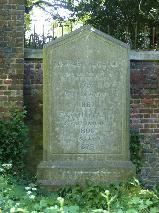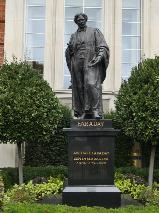Faraday, Michael |
| CHEMIST, PHYSICIST (ENGLAND) |
|
BORN 22 Sep 1791, London: Newington Butts, Southwark - DIED 25 Aug 1867, Hampton Court, Greater London GRAVE LOCATION London: Highgate Cemetery West, Swain's Lane, Highgate (Sandemanian plot (against the wall, near the Grey House)) |
|
Michael Faraday was the son of James Faraday, who was a member of the Christian Glasite sect. In 1790 the family moved from Outhgill in cumbia to London and in 1791 Michael was born as the third of fourteen children. When he was fourteen years old, he was apprenticed to the bookbinder and bookseller George Riebau. For seven years he worked there, and he read many books, including "The Improvement of the Mind" by Isaac Watts and "Conversations on Chemistry" by Jane Marcet. He also attended lectures during at his apprenticeship and in 1812 the lecturers included Sir Humphry Davy and John Tatum. By the time his apprenticeship ended, he sent Davy a book based on notes that he had taken during the lectures he received a friendly reply. In 1813 Davy damaged his eyesight and employed Faraday as an assistant. Around the same time there was a vacancy for a Chemical Assistant at the Royal Insitution and Davy saw to it that Faraday got the job. He accompanied Davy and his new wife Jane to France in 1813 where Davy received the prix du Galvanisme that was awarded to him by Napoleon. They also travelled to Switzerland and Italy, where they visited the edge of the crater of the Vesuvius volcano. On 12 June 1821 he married Sarah Barnard (1800-1879) and after their marriage they attended the Sandemanian church. No children were born. Faraday conducted research in many fields, but he was best known for his reseach on electriciy and magnetism. After Hans Christian ěrsted discovered electromagnetism in 1821, Davy and William Hyde Wollaston tried to design an electric motor but failed. After discussing their work with them, Faraday managed to build a device for electromagnetic rotation, known as the homopolar motor. He published his results without mentioning the other to men and this put a strain on his relationship with Davy. Faraday went on discover the principles of electromagnetic induction, diamagnetism, and laws of electrolysis. He created the first electric dynamo in the early 1830s. As a chemist he discovered benzene and invented an early version of the Busen burner. In 1824 he was elected a Fellow of the Royal Society but would refuse to become its president twice. He started giving Christmas lectures for young people at the Royal Institution in 1827 and he continued this until 1860. In 1832 he accepted an honorary degree as Doctor of Civil Law from the University of Oxford. In 1839 he suffered a nervous breakdown, but he recovered, and he was able to continue his research. In 1845 he coined the term diamagnetism. Faraday became a member of the Academies of Science in Sweden (1838) and France (1844) and a member of the American Philosophical Society in 1840. He refused a knighthood on religious grounds. He was an advisor to the Great Exhibition of 1851, but he refused to advise the government on the production of chemical weapons for use in the Crimean War (1853-1856). A few years before he died, he turned down an offer to be buried in Westminster Abbey. In 1867 he died in Hampton Court, and he was buried in the dissenter's section at Highgate East Cemetery. A plaque for him was placed in Westminster Abbey near the grave of Isaac Newton. Related persons • was sculpted by Baily, Edward Hodges • worked for Davy, Humphry |
| Images |
Sources • Browning, D.C. (editor), Dictionary of Literary biography, Dent, London, 1958 • Michael Faraday - Wikipedia (EN) • Just a moment... |




